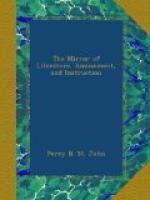* * * * *
THE BEAUTIFUL.
To be convinced that, at some period or another of their history, the Egyptians had conceived a beau-ideal superior to the beautiful which nature habitually produced in their country, we have only to examine the young Memnon, at the British Museum, and the heads of many of the sphinxes which remain.—Weekly Rev.
* * * * *
ALGEBRA.
Algebra I was charmed with, and found so much pleasure in resolving its questions, that I have often sat till morning at the engaging work, without a notion of its being day till I opened the shutters of my closet. I recommend this study in particular to young gentlemen, and am satisfied, if they would but take some pains at first to understand it, they would have so great a relish for its operations, as to prefer them many an evening to clamorous pleasures; or, at least, not be uneasy for being alone now and then, since their algebra was with them.—Life of John Buncle.
* * * * *
A LUCKY MATCH.
The late Mr. Locke, of Norbury Park, commissioned one Jenkins, a dealer in pictures, residing at Rome, to send him any piece of sculpture which might not exceed fifty guineas. Jenkins sent a head of Minerva, which Mr. Locke, not liking, returned, paying the carriage, and all other expenses. Nollekens, who was then also at Rome, having purchased a trunk of Minerva for fifty pounds, upon the return of this head, found that its proportion and character accorded with his torso. This discovery induced him to accept an offer made by Jenkins of the head itself; and 220 guineas to share the profits. After Nollekens had joined the head and trunk, or, what is called “restored it,” which he did at the expense of twenty guineas more for stone and labour, it proved a most fortunate hit, for they sold it for the enormous sum of 1,000 guineas! and it is now at Newby, in Yorkshire.—Nollekens and his Times.
* * * * *




